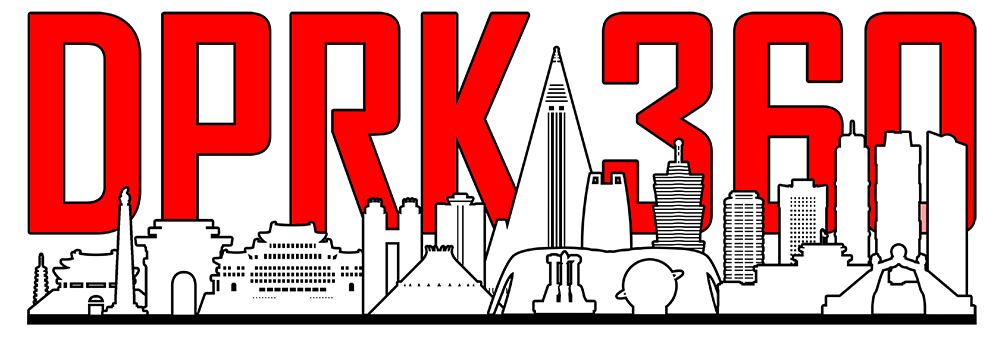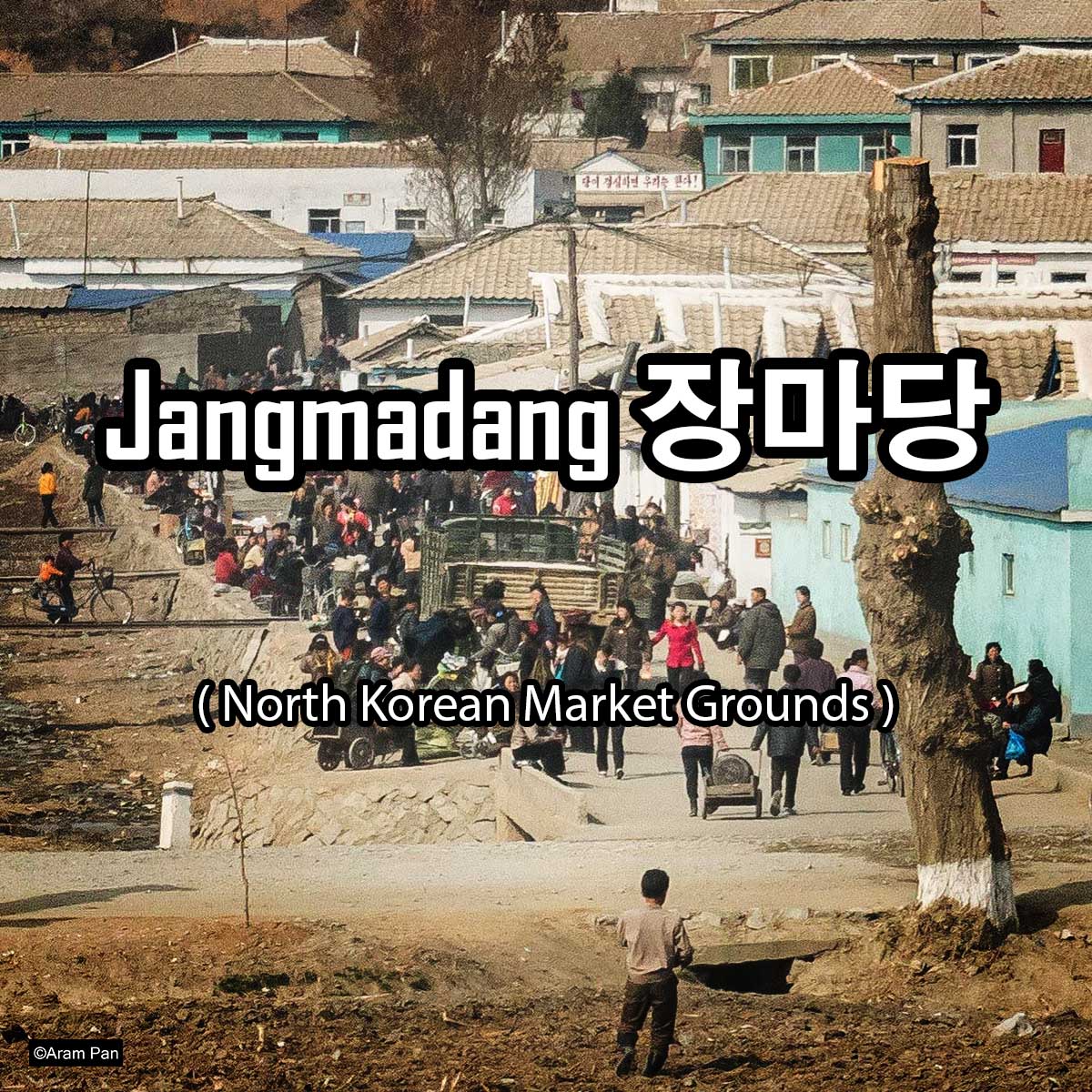Jangmadang
My article is not meant to disparage mainstream media reports but to serve an update to the current situation as I have observed the evolution of the North Korean economy since my first visit in 2013.
Based on what I’ve read on the internet, I first had the impression that any form of private enterprise would be illegal in this communist state. However, there has been more than anecdotal evidence to prove North Korea is ready for international business cooperation.
Jangmadang
I have seen several of North Korea’s market grounds, known as “Jangmadang”. Foreigners rarely ever get to see them and those who are allowed to visit are forbidden from bringing any cameras or mobile phones. These photos of the market grounds were photographed from a distance.
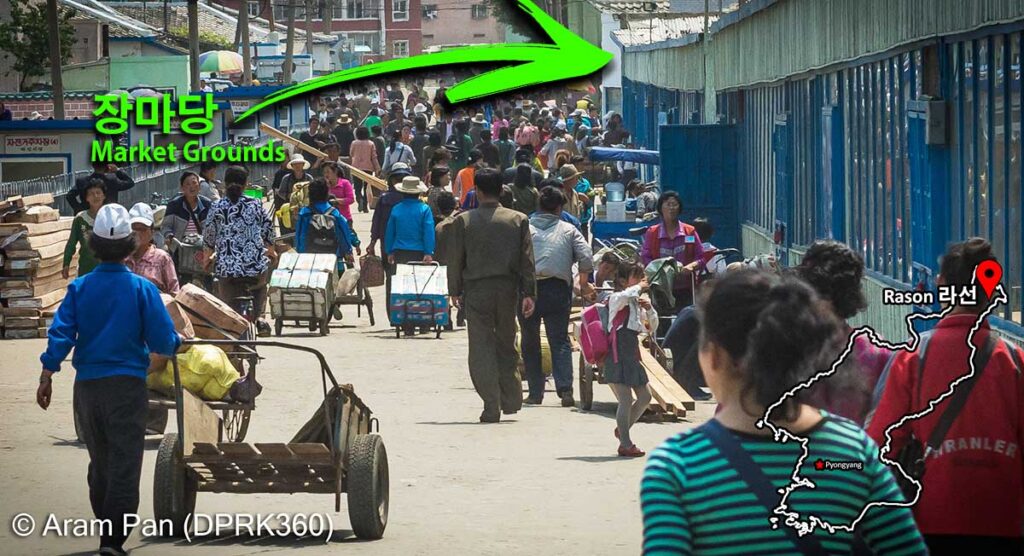
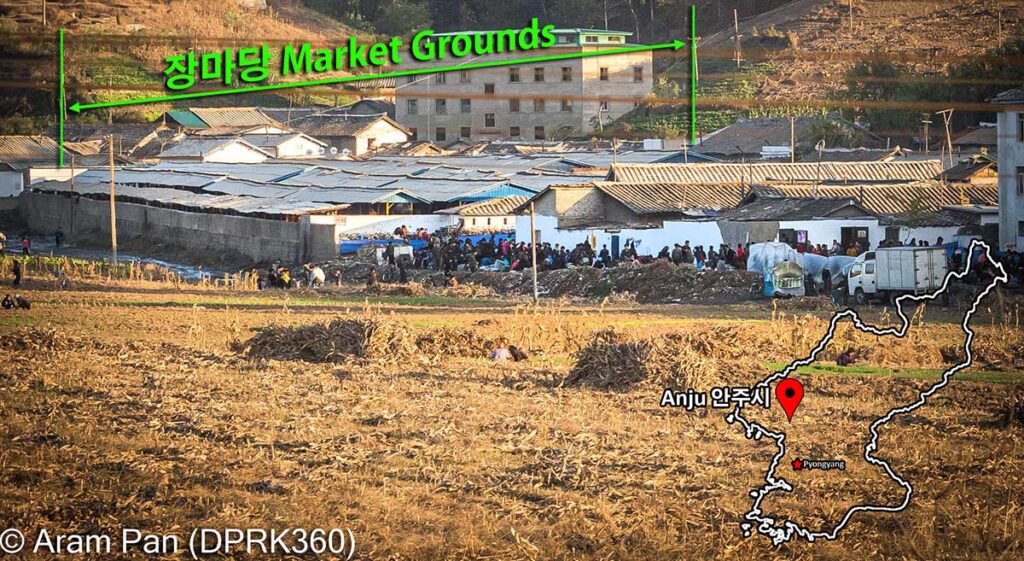
Jangmadangs are very crowded and noisy with the sound of locals bargaining and I’ve seen all sorts of things sold. To help you get an idea of what a Jangmadang looks like inside, I’ve drawn a diagram of how the stalls look like. Jangmadangs are open air spaces with sheet metal roofs built over the stalls to offer some shade from the weather. The ground is generally a combination of cement and dirt hardened by thousands of trampling feet.

There’s always a section selling fruits and vegetables from the local farms and also produce imported from China.
There’s a few stalls selling various types of Korean sauces and dried food. One sauce that really stood out from the rest was Maggi Seasoning because I recognized it. There were also a couple of other Chinese sauces and some mysterious bottles of liquid without labels.
There’s a section displaying meat sold without refrigeration, and hung on steel hooks. I think they were pork and mutton, but I couldn’t be sure as they only hung small slabs of between 1 to 3 kilograms each.
There’s a section consisting of several stalls selling clothes, underwear, sunglasses, pantyhose, socks, shoes, hair clips. soaps and shampoos. Some looked like locally produced apparel while others were clearly Chinese fashion imports. I tried on a local styled jacket but their largest size couldn’t fit my fat body. One interesting and unusual observation is that foreign shampoos and soaps I saw on sale had the models on the packaging blacked out with a marker pen.
There’s also a hardware section selling tools, power generators, electrical transformers, voltage stabilizers, solar panels, batteries and automobile spare parts like belts, exhaust pipes, windshield wipers and 2nd hand car tyres.
Lastly, some of the outer stalls sell food. These appear to be food prepared at home and brought to the market grounds for sale. Some had a small charcoal furnace on the ground to keep the pot warm.
Around the outskirts of the Jangmadang there are lone sellers. They don’t have a stall and usually only sell one to three different items in small quantities. They would squat near routes where there’s plenty of human traffic and wait. Unlike peddlers in China or Southeast Asian countries, North Korean sellers don’t call out to customers and seem to just passively wait for business.
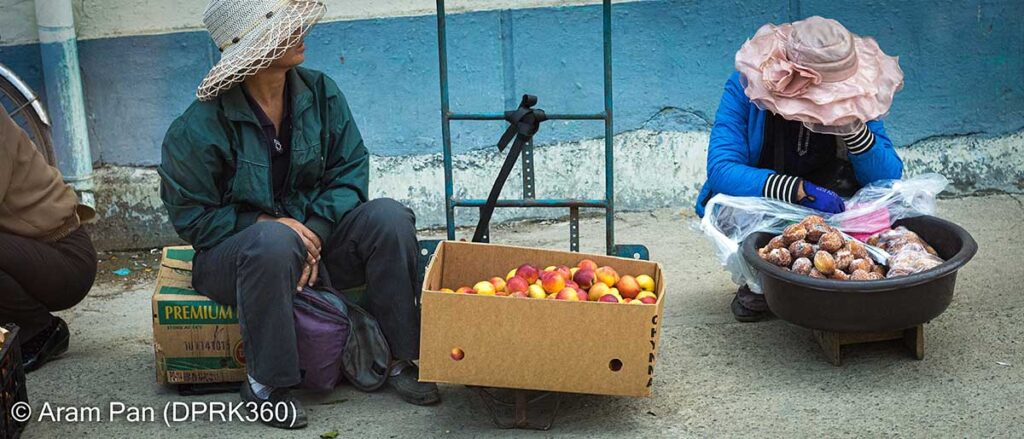
The entire area surrounding the Jangmadang is also hive of activity as people go about transporting goods back and forth. They move hurriedly between trucks unloading goods and what appears to be some very small rooms converted into warehouses.
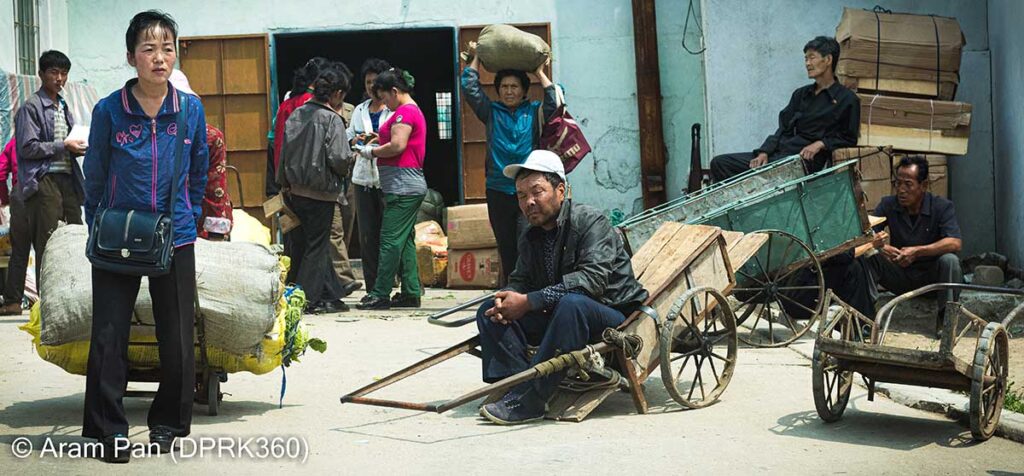
Over the years, the North Korean government implemented reforms that encouraged farmers to plant their own produce, aside from the crops designated to each “farming unit”. This allowed farmers to easily barter or sell their private produce. These private crops aren’t visible to tourists as they drive through the countryside but I had the opportunity to conduct a low pass flight over several farms and spotted these privately grown crops.
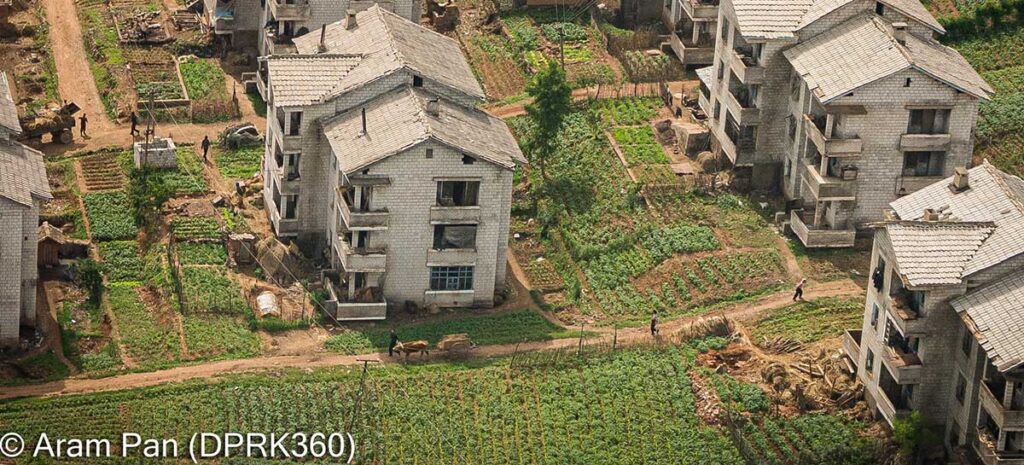
There are several narratives being circulated about North Korea. These narratives generally try to define North Korea according to the type of audience they are targeted at.
- “The Socialist Utopia” – There is no trace of capitalism and North Korea does not have the need for filthy capitalistic ways.
- “The Draconian Communist Regime” – Communist leaders stamp out any form of private enterprise and anyone caught dabbling in capitalism will be severely punished.
Both ends of the narratives try to push a “black or white” message but I see North Korea trying hard to update it’s existing socialism to version “1.5”. They still have some ways from being a capitalistic system but from what I see, they don’t seem at all opposed to the benefits of a mixed system.
One might think that the dilapidated and make-shift state of such Jangmadangs is evidence of North Korea’s disdain for a free market economy. This is far from the truth.
Firstly, North Korea has been planning to increase additional “Special Economic Zones” around the country. In such zones, different and more relaxed laws apply with regards to business. SEZs are therefore an effective workaround to the existing socialist norms.
Secondly, I re-visited a Jangmadang a few years apart. Old areas of makeshift stalls were torn down and replaced with two to three storey concrete buildings and halls. These structures now provide proper lighting, sanitation and shelter from the elements.
The first “New Jangmadang” I visited consists of an area with many two storey shops. The upper level is usually the store room while the ground floor serves as the shop. There’s usually a larger corner unit that can be used as a restaurant or for selling bulky items like automobile parts.
The second type is the Jangmadang Hall. This is basically a two storey high hall with higher than average ceilings (around 3-4 meters high). Inside these halls, the locals can set up their makeshift stalls. Wooden benches common with the old Jangmadangs are now replaced by aluminum and glass display shelves on casters. Additional goods are stored at the stall in large plastic tubs with lids.
Unfortunately, I was again not permitted to bring my mobile phone or camera into any of these new Jangmadangs so there are no photos. However when I came across a new Jangmadang under construction, my minder wasn’t opposed to me taking a photograph.
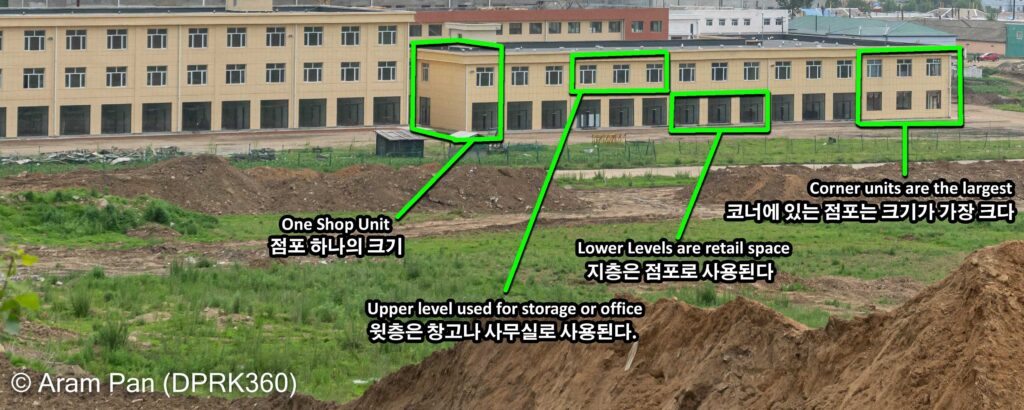
What does it mean?
North Korea is ready elevate itself to a new age. This evolution will only be complete through the help of businessmen around the world. Money has been the lifeblood of every nation since the beginning of time. Businesses are the real reason the world is as connected as it is today, and not ideology, religion or wars. Business drives progress.
I believe the only way forward is to gradually lift the UN sanctions and allow anyone to do business with North Korea. Before COVID-19 hit, North Korea was already experiencing a sharp increase in the number of middle income citizens in Pyongyang, and also in it’s provinces bordering China. This growing “spending-class” has been empowered by the DPRK’s evolving regulations as so many more people are getting into private businesses.
I once met a North Korean lady while on the train from Dandong to Pyongyang. She opened her luggage to get something and I saw that it was completely full of fashion sunglasses. We had a very brief conversation in Chinese and I discovered she was a waitress working in China and these sunglasses were her side business. She was bringing them home to sell.
North Koreans want the exact same things we want and they are no different from us. I believe that allowing businesses to deal with North Korea will give rise to a growing economy that will ultimately create an environment where nobody will want to give up their economic riches and stability to create geopolitical tension. South Korea, Japan, China and even USA stands to gain so much by adding North Korea into the international business community.
I look forward to seeing this day.
